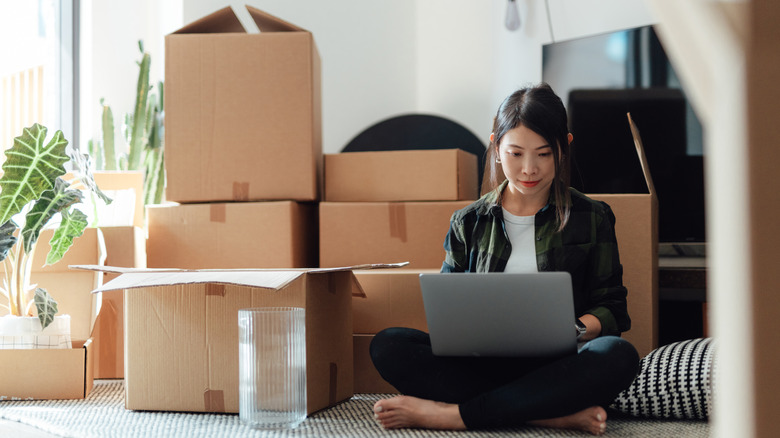The Important Step You Need To Remember When Planning A Move
Does the sheer thought of having to pack up all of your belongings and move to a new place feel overwhelming and stressful? You're certainly not alone! While moving to a new place can often bring excitement for the start of something new, it can also be incredibly time consuming and expensive, leading to stress. In fact, 54% of the 2,000 people surveyed by Clever Real Estate (per Home Bay) in 2023 reported that the total cost to move was higher than they thought it would be. So, as you plan for your next move, an important step you should take is to set a moving budget.
There are a few factors that often have the biggest impact on your total moving cost: the distance of your move, the amount of belongings you bring with you, and whether or not you hire a moving company. For example, the national average of using a professional moving company to move locally into a two-bedroom is around $2,100, while a long-distance move can be over $9,500. Furthermore, whether your move is in-city or out-of-state, taking the time to declutter your home and downsize your belongings could have a significant impact on your total moving cost. With this in mind, here's how to create a moving budget that will help you feel more prepared for your next move, both mentally and financially.
How to set a budget for planning a move
There are two ways to keep track of your moving budget and expenses. The first is to jot it down with pen and paper. The second option is to set up a simple spreadsheet with at least two columns: the first for the type of expense, and the second for cost. To start the list, add all your basic moving costs, including the moving company or truck rental, packing supplies, and gas or transportation costs. If you have a long-distance move, you'll also want to add costs like lodging, meals, storage, and car shipping. Whether you're just moving across town or across state lines, you may also want to consider if moving insurance is worth the money for you. With these estimates listed out, you can get a better idea of what your total moving costs will be and which options make the most sense for your overall budget.
Lastly, keep in mind any unexpected costs that may arise. Data from Home Bay also reported that more than half of the people surveyed had unexpected costs come up during their move. To account for this, add at least 5% of your total cost to your budget to feel as prepared for the unknown as possible. Now that you have a clear idea about how to set a moving budget to help alleviate some of the moving stress, find out the best way to stay organized before making your big move and try to steer clear of bad moving advice that could add more stress to the process.

